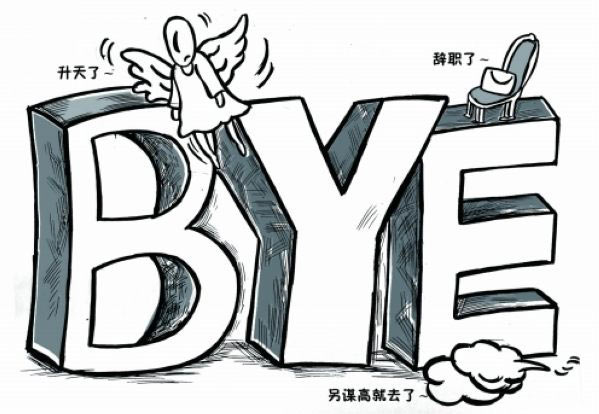Leadership tips for young managers
By Robert Parkinson, Founder of RMG Selection

Manager, a sacred word in business which has connotations of hope and trust, is a very serious job title in the West, where the average age of managers is between 30 and 40 years old. The development of the Internet has changed some traditional industries dramatically in recent years. A senior manager in logistics might be good at managing the whole business process, but does he have any idea about operating a modern overseas warehouse? That is probably an area where his strengths are useless. Nowadays, more of the bright and talented young employees who have required knowledge and skills are promoted to be managers. But excellent as many young leaders are, they usually face a lot of challenges during the first big step up in their career. This article explores some of the pitfalls they may face and suggests some of the better ways of dealing with difficult situations.
Differences in behaviour, before and after promotion:
The purpose of promotion is to recognise an employee’s good performance at work. A young salesman, for instance, can be promoted to be a sales manager who is responsible for the performance of five sales people because of his amazing likability. Clients want to give them business and colleagues enjoy having them as a friend.
However, that doesn’t mean they are the perfect choice for a managerial role. If they used to show up 30 minutes late to work every other day and skulked away once in a while, neither had any negative impact on their sales figures, but it may mean they are not best suited for a managerial position. What do you think team members will do if they see their leader is late for work every day? Naturally they will follow! Therefore, a big difference young managers must make is to correct their own shortcomings and work on being a good example for team members. That is the basis of your credibility!

Dealing with your peers:
The major challenge for many young leaders is the changein relationship with their peer groups. Some think the shoe fits them quite well hence they tend to differentiate from their peers. However, others believe that not losing friendship with their peers is the priority.
Managers should be aware that they are responsible for the performance of others and try to develop a serious working relationship with their peers without letting it affect friendships.
Managinng the unmanageable:
Every manager at some point in their career has the unenviable task of having to deal with the “unmanageable” My advice for young managers is to find out, first and the foremost, why is this team member difficult to manage.
Listen to them! Team management is about communication. If a member of the team doesn’t listen to you and follow your plans, instead of complaining to a senior manager, you should at least try to listen to them first. Listen to their feedback on your plan and also listen to the plan they come up with. A good leader is not one who excels at everything but someone that excels at making the best use of others.
Building personal confidence:
Another problem that young managers face is self-doubt. The voice of doubt normally starts when you have to deal with senior team members. The volume then keeps going up until it plagues your mind. The solution is very simple â stop it!
Focus on the positive sides of decisions that you make. The second step is to balance the negative sides. Thirdly, take time to rest outside of work. Go out with your friends to grab a drink or have a nice dinner. Anything that makes you happy is good for your confidence. The last step is to visit/call someone who can offer good advice. They can be your coaches, mentors, managers etc.
Your first few important decisions are probably made during this process. But that’s OK confidence building doesn’t happen all at once. Understanding this process will help young managers build up confidence gradually. In the meantime, be open to mistakes! It will help you grow as a manager.

Learning to say “no”:
Saying “no” to team members can be difficult. Some ask for casual leave and others ask too many questions. The key is all about the language. In other words, it’s not what you say but how you say it. Most young leaders are afraid to reject their team members because they do not want to damage the relationship. But this is the wrong way to go.
Think about the impact on other team members that watch you agree with everyone’s requests. They might think that you are a nice and easy-going person, but they may also regard you as a weak manager. Learn to reject unnecessary requests with kindness. Either a small talk or a mocking joke can easily let employees know that what they request is not appropriate.
To read the original article, please click: http://t.cn/RcNiWgu



 So, here are my conclusions about the current situation:
– Let me introduce ‘The Squeezed Middle’. The squeezed middle is, what I would term mid-producing staff who are partly business critical, and, importantly who have compensation packages which have been over-negotiated. For example, a person who works in the finance management function of a company, who came from a competitor, and is above the market average for their position in terms of compensation, and achieves 50-70% of what they are capable of would be what I would term someone who is the ‘squeezed middle’. They are semi-business critical, in that they occupy an important function of your business, and they bring great market knowledge [from the competitor] but they are not people who generate revenue for your company in either a marketing or a sales capacity. I have witnessed the salary expectations of the squeezed middle rise vastly out of proportion to, for example marketing functions throughout my career working in China, and at each economic hurdle (for example after the Lehman Crash of 2008) it is the squeezed middle who are the first to suffer in cost-cutting rounds, and then the squeezed middle that retaliates with increase-demands of ‘my expectations are a 30% increase’ (where’s the logic) when the market comes back.
– Secondly, in contrast to the squeezed middle, the opposite effect happens with another group I call the ‘100-percent-ers’. The 100-percent-ers are those people who are 100% critical to the revenues of the business. They are often passive candidates who require approaching directly. Examples are of course obvious. We are talking about people who sell successfully (I say successfully as, although a cliche, it’s a fairly consistent observation that only 20% of an organisation’s staff engaged with client-facing activities are actually successful), or if a marketing-driven business have a demonstrable record, etc. These 20% highly-effective 100%-percent-ers are the people that bring the money in, so in fact in a difficult market I see very consistently a rise in demand for 100-percent-ers. Why? Well in business you really have only two choices: You can either cut your costs or increase your revenue. Cost cutting is a finite activity. There is only so much to be cut, whereas increasing sales is infinite.
So, here are my conclusions about the current situation:
– Let me introduce ‘The Squeezed Middle’. The squeezed middle is, what I would term mid-producing staff who are partly business critical, and, importantly who have compensation packages which have been over-negotiated. For example, a person who works in the finance management function of a company, who came from a competitor, and is above the market average for their position in terms of compensation, and achieves 50-70% of what they are capable of would be what I would term someone who is the ‘squeezed middle’. They are semi-business critical, in that they occupy an important function of your business, and they bring great market knowledge [from the competitor] but they are not people who generate revenue for your company in either a marketing or a sales capacity. I have witnessed the salary expectations of the squeezed middle rise vastly out of proportion to, for example marketing functions throughout my career working in China, and at each economic hurdle (for example after the Lehman Crash of 2008) it is the squeezed middle who are the first to suffer in cost-cutting rounds, and then the squeezed middle that retaliates with increase-demands of ‘my expectations are a 30% increase’ (where’s the logic) when the market comes back.
– Secondly, in contrast to the squeezed middle, the opposite effect happens with another group I call the ‘100-percent-ers’. The 100-percent-ers are those people who are 100% critical to the revenues of the business. They are often passive candidates who require approaching directly. Examples are of course obvious. We are talking about people who sell successfully (I say successfully as, although a cliche, it’s a fairly consistent observation that only 20% of an organisation’s staff engaged with client-facing activities are actually successful), or if a marketing-driven business have a demonstrable record, etc. These 20% highly-effective 100%-percent-ers are the people that bring the money in, so in fact in a difficult market I see very consistently a rise in demand for 100-percent-ers. Why? Well in business you really have only two choices: You can either cut your costs or increase your revenue. Cost cutting is a finite activity. There is only so much to be cut, whereas increasing sales is infinite. In 17 years working in Human Resources I have worked in the UK (I’m a Brit), the Netherlands, Belgium, the USA and China (10 years). In every place I have worked I have observed a similar pattern, the only exception being the fair-weather salary increases demanded in China. When the economy catches a cold, some companies get the flu, whilst others (who tend to do what I’ve just described and hire the 100-percent-ers) boost their immunity. Indeed in the last 4 months RMG has seen an increase in demand for client-facing talent throughout China.
RMG Selection specialists in recruiting high-quality professional Chinese and International candidates in the following disciplines and sectors: Sales, Marketing, General Management, Legal, Finance & Accountancy, Human Resources, Information Technology, Logistics, Healthcare, Pharmaceuticals, Automotive & Machinery, General Manufacturing, Internet.
More information please refer to original artical:
In 17 years working in Human Resources I have worked in the UK (I’m a Brit), the Netherlands, Belgium, the USA and China (10 years). In every place I have worked I have observed a similar pattern, the only exception being the fair-weather salary increases demanded in China. When the economy catches a cold, some companies get the flu, whilst others (who tend to do what I’ve just described and hire the 100-percent-ers) boost their immunity. Indeed in the last 4 months RMG has seen an increase in demand for client-facing talent throughout China.
RMG Selection specialists in recruiting high-quality professional Chinese and International candidates in the following disciplines and sectors: Sales, Marketing, General Management, Legal, Finance & Accountancy, Human Resources, Information Technology, Logistics, Healthcare, Pharmaceuticals, Automotive & Machinery, General Manufacturing, Internet.
More information please refer to original artical: 

 A special period in your career is the notice period which is the time after you submit your resignation letter to your boss but before you leave your company. We will focus on this special time and give you guideline today. CEO of RMG Selection, Robert Parkinson is going to share some valuable suggestions.
A special period in your career is the notice period which is the time after you submit your resignation letter to your boss but before you leave your company. We will focus on this special time and give you guideline today. CEO of RMG Selection, Robert Parkinson is going to share some valuable suggestions.